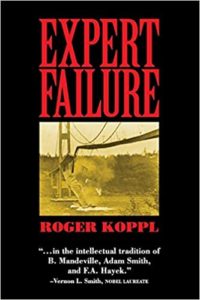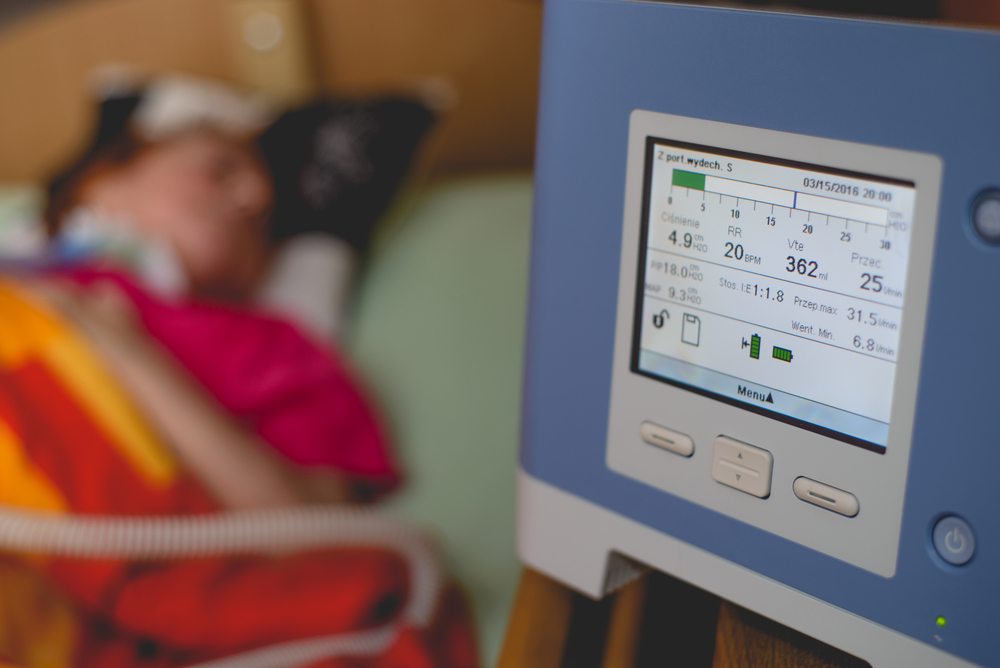Part 3: Should Experts Have Power?
In my last two EconLog essays (here and here), I examined some of the causes of expert failure seemingly at work in the present crisis. I pointed out that we don’t know how to strike a balance among the different expert silos such as medicine and economics. And I pointed out that in many areas of expertise, state-supported professional associations enforce uniformity of opinion so that we don’t get the sort of flexible thinking and multiple perspectives we need even more urgently now than in normal times. I don’t know which epidemiological models are best. And nobody knows the best policy package. We cannot somehow escape the urgent necessity of making collective choices to fight COVID-19. In this difficult moment, we should be respectful of the extreme difficulty of formulating policy. In the midst of it all, however, we should also reflect on how very hard it has been to wisely deploy expertise in a crisis. Is there a better way?

I think we have made our lives harder – and put them at greater risk – by trying to contain expertise in officially recognized boxes controlled by the very experts ensconced within them. I refer to the “expertists template” of certification, professional education, and continuing education that I described in my previous essay in this series. When expertise is organized into state-supported professional organizations such as the AMA, it tends to enforce orthodoxy. And that means less pliable, flexible, and adaptive thinking. It means less tinkering and more doctrine. Oops.
The expertist template is premised on the view that knowledge is hierarchical. It starts at the top with science and cascades down to ever lower levels of the knowledge hierarchy. Mere practitioners must not question the knowledge elite. But questioning is precisely what we need in crises. In his essay, “What is Science?” Richard Feynman remarked “Science is the belief in the ignorance of experts.” When we give experts power, including the power to decide who the experts are, we choke off science. The premise of a rigid hierarchy of knowers is mistaken. The knowledge we need in normal times and crisis times alike is distributed. It’s out there in thee and me and in all our habits practices and experience. It is not a set of instructions and doctrines coming from on high. It arises of its own from our many decentralized interactions.
Let’s take an example. The pandemic has produced a shortage of “personal protective equipment” (PPE) such as masks and gowns. What can we do? One very helpful solution comes out of a relatively small company in Ohio, Battelle. They have a machine that can clean large quantities of PPE in a hurry. The knowledge of how to do it did not come down from scientific inquiry, but up from entrepreneurial action. And yet, as I write, the knowledge elite at the FDA “has authorized Columbus-based Battelle to sterilize only 10,000 surgical masks in Ohio each day, despite their ability to sterilize up to 160,000 masks per day in Ohio alone.” The official knowledge hierarchy is squelching the sort of adaptive tinkering that we need to improvise our way out of this mess.
This distributed quality of expertise follows from its source in the division of labor. As I said in the first essay of this series, the division of knowledge is the flip side of the division of labor. But that means that is it not some simple hierarchy dictated from on high. It is emergent, protean, and evolving. It does not cascade down, it bubbles up.
Consider ventilators. March 24th, the FDA lifted many of restrictions on ventilators. Hospitals have been restricted to using only “FDA-cleared ventilators.” The lifting of restrictions reveals the folly of pretending that the knowledge elite can pre-decide what medical equipment is acceptable. Just as they could not reasonably have foreseen the current pandemic, they cannot reasonably foresee the many idiosyncratic particulars of time and place that might turn otherwise sensible regulations into life-threatening folly. If there had been no such restrictions in the first place, how many new emergency ventilators might have long since arrived in our hospitals? Instead, we have seen “ventilator sharing.” And can we be sure that there are no remaining restrictions that should also be lifted? You still require FDA approval; it’s just that the FDA approves more things.
We need a better way. We need a resilient system in which local knowledge comes with local decision-making authority. But, how do we get there? Because we have had a relatively controlled and hierarchical system, markets have not had much opportunity to work up the sort of institutions and arrangements we need when choosing among experts. If we just tear down the expertist template, we will be left without guidance. Let us set to work then, at the hard task of learning how to dispense with the expertist template and return power and energy to entrepreneurialism.
Roger Koppl is Professor of Finance in the Whitman School of Management of Syracuse University and Associate Director of Whitman’s Institute for an Entrepreneurial Society (IES).


READER COMMENTS
David Henderson
Apr 2 2020 at 10:33am
Excellent essay. Thanks, Roger.
Jon Murphy
Apr 2 2020 at 10:56am
Absolutely brilliant 3-parter. I am going to use this as the basis of my Law & Econ lecture in my principles micro course.
Alan Goldhammer
Apr 2 2020 at 12:14pm
Unfortunately, massive production of diagnostic test kits, development of a vaccine and a drug for treating SARS-CoV-2 are not amenable to local knowledge and decision making authority.
Jon Murphy
Apr 2 2020 at 12:22pm
Why not?
robc
Apr 2 2020 at 1:36pm
I can’t think of anything that is more local knowledge than the inside of a drug company.
Robert EV
Apr 3 2020 at 12:36am
They quickly amended this to allow Battelle to use their maximum capacity.
Imagine if a quack company proposed to do the same sort of thing with “vaporized” colloidal silver. There is a point to health system process certification, even, and maybe especially, in emergencies.
As a “practitioner” in a lab (though granted, as a research associate, not as a technician), I don’t see this. At least not anymore (as a perma-temp R&D technician in a company it was indeed hard to do things variant from the process my superiors wanted, though this inhibition greatly lifted when I became a career associate at a government institution.).
Jon Murphy
Apr 3 2020 at 12:06pm
Right, but note the problem: the FDA had to amend their decision.
Robert EV
Apr 3 2020 at 1:58pm
Okay? But note the problem: quacks.
Jon Murphy
Apr 3 2020 at 2:45pm
Of course quacks exist. They have and they will. Why is the government better at stopping their influence than private certifications?
Phil H
Apr 6 2020 at 10:42pm
“Why is the government better at stopping their influence than private certifications?”
There is a very straightforward answer to this: history says so. Before government regulation, medicine was rubbish. Now, medicine is quite good. The libertarian claim must be that this is complete coincidence. That better medical technology just *happened* to come along with government regulation. But it’s too much coincidence for me to swallow.
Mark Z
Apr 6 2020 at 4:10pm
Battelle is I believe a pretty well established company that does a lot of work for the federal government, I believe the department of defense mostly. So a lack of overall credibility with the feds can’t really explain the restriction.
blink
Apr 3 2020 at 3:14am
Very nice sequence of articles; thanks for writing these, Roger.
The final paragraph nicely sums things up theoretically — we want local decision-making to follow local knowledge. I can also agree that we do not have effective “institutions and arrangements we need when choosing among experts” because we have relied on a poor centralized model. But what can we expect by way of improvement? When? Even admitting that we cannot predict market innovations, are there at least some parallels to consider? What evidence suggests that markets will work well here?
Roger Koppl
Apr 3 2020 at 8:26am
Thanks, blink. That’s the thing. We have to unwind it, but we don’t yet know how. Think of the good done by the Insurance Institute for Highway Safety (IIHS). Those are the crash test guys. The insurance companies had an interest in safe cars that was not fully shared by the car makers. So they formed IIHS, which helped give us safer cars. The healthcare market is so badly trussed up with various government controls and restrictions that nothing similar has been able to emerge there. If we are smart about liberalizing healthcare markets, we can enable that sort of thing in healthcare too. But we don’t know how to do it. It’s a good problem for people to think about.
Phil H
Apr 3 2020 at 10:10am
This is a confusing reply, because what makes you think that the IIHS is better than a government alternative? There are lots of problems with the essay, including the confusion between scientific hierarchies and government hierarchies, but this point offers a nice clean example to discuss.
There are loads of problems with the crash test dummy tests. Deciding whether to do them head on or partial side, what specs of dummy to use… these are all controversial issues. I didn’t have to Google it, these are controversies that have hit the news before. So what is the rationale for declaring that the IIHS has necessarily got it right – or is more likely to get it right – than a government agency?
Jon Murphy
Apr 3 2020 at 11:00am
The answer is in Roger’s comment:
Insurance companies, like anyone else, want to minimize their costs. It’s in their interest to try to “get it right.” Conversely, government agencies face different costs that they want to minimize; it’s much harder for them (even without assuming any corruption or malice or incompetence on their part) to “get it right.”
nobody.really
Apr 3 2020 at 5:37pm
I had the impression that each insurer had its own department for evaluating whether to cover a given type of drug or procedure–and these judgments reflect a kind of cost/benefit analysis. (I think health insurers have a standard phrase for this criteria–“standard, conventional, and effectatious care” or something.) In particular, insurers may decline to cover experimental drugs or treatments. This practice seems analogous to the IIHS, but without the collectivist aspects.
JonB
Apr 3 2020 at 9:33pm
Having worked with the FDA before I can attest to a stunning level of clinical and economic incompetence. Process is everything, Basic knowledge of underlying physiology not so much. Economic constraints patients might have in accessing new treatments. That would never cross their radar….
This is a really easy problem to solve. So easy.
Competitive certification.
If another organization could create a more efficient process to balance risk and benefit, the market would move towards that model. The FDA has now only the bluntest incentive to reform. Abolish the government monopoly on drug certification and create safe regulatory harbors for alternative innovation, This is the idea behind Federal and State Right to Try legislation but needs to be expanded to illness which do not pose a risk of death within 6 months……
Roger Koppl
Apr 6 2020 at 8:25am
Great comment, JonB. Your idea of regulatory competition is highly suggestive. Separately, Roberta Romano and Hans Stoll have suggested something like this for financial markets regulation. I don’t recall seeing the idea applied to pharmaceuticals, however. It sounds like you may have some good knowledge and understanding in this area. To your knowledge, is there a literature on this? Your comment seems worth pursuing seriously.
Comments are closed.